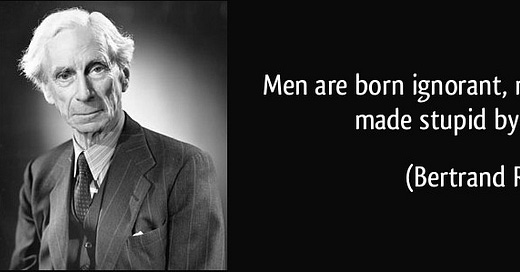How can smart people be so stupid?

I know some smart people. I know that they are smart because they have all the credentials, the accomplishments and the recognition to prove it. They are experts in their fields, they are clearly knowledgeable, they are articulate and very confident about the value of their knowledge.
Yet, when it comes to subjects that is not in the direct purview of their field of expertise, they can be excessively stupid and difficult to argue with. Their stupidity on those subjects can be outright obnoxious.
This conflict of smart and stupid is a puzzling contradiction that can probably be better explained by psychology than logic. We all have some sort of biases and, unfortunately, educated people have more than the simply ignorant. The age of the polyhistors is gone. It is simply not possibly to know everything, but those who do know a lot about something tend to think that they know more about other things than they actually do. This leads to a number of biases, all based on conceit.
#1 – the conceit of intelligence
When people are accomplished in any one field, when their advice is sought, it is easy to fall into the belief of infallibility. It is assumed that if they are knowledgeable on one subject, they are smart, and if they are smart, their judgment on other subjects must be equally smart.
#2 – to conceit of education
I could throw a dozen quotes at you about the detrimental effect of too much education on people’s ability to think. There are several studies confirming that education increases ideological bias. Jacque Ellul makes the point in his book “Propaganda” that more education makes people more susceptible to propaganda. The basis of this phenomenon is the false belief that education puts you beyond the reach of propaganda. It is no secret that institutions of higher education, especially their humanities faculties have been taken over by cultural Marxist, postmodernists and other progressives. The result is a very strong leftist bias based purely on ideology coupled with an equally strong belief in the objectivity and morality of these biased views.
#3 the conceit of expertise
...and the disdain for common sense. Smart people tend to be experts on some things, naturally appreciating the importance of expertise. They believe that their judgment on the subject of their expertise is naturally superior to that of a layman. They believe that their expertise empowers them to make better decisions than the people who are affected by those decisions. As an extension, they believe that whenever possible, decisions should be made by experts on behalf of the people without such expertise. It is assumed, that the subject matter knowledge of the expert is more important than the intimate knowledge of the special circumstances by the layman. Experts want the world run by experts because they do not believe that the right answers can emerge from the chaos of the free market.
#4 – the conceit of morality
The conceit of morality is probably the most important part of the phenomenon. Well-meaning people tend to believe that meaning well is the most important criterion of morality. Most of them also believe that it is a sufficient criterion. Radical leftists believe that it is the only one. Reality, consequences, evidence be damned. Being nice, going with the flow, virtue signaling, moral posturing and the comfort of conforming with the prevailing ideological fashion is an easy replacement for hard choices. Morality is not easy, doing the right thing often involves making difficult choices. The cost of passing on the responsibility for these choices to an outside agent may seem not only reasonable, but a good deal for most. For many, saying that “somebody should to do something about this” or outright demanding that ‘X’ should force ‘Y’ to do something for ‘Z’ is a good enough replacement for actual moral action. Showing that they care and stand for the right things is what they consider morality to be.
All of the above, however, is not an excuse, just an explanation. They are describing the problem rather than explaining it. I would still expect apparently intelligent people to be able to have a reasonable conversation about any subject. What I still do not understand is what makes them deaf and blind to reason, logic and evidence? What makes them unable to have their intellectual faculties to recognise and overcome these limitations?
The answer, as I suggested, may be in psychology, possibly even biology. Nothing else can explain the difficulties of communication, the way reason seems to bounce off of even people with clearly demonstrated high cognitive abilities. Quite often I feel as if I was in “Groundhog day” or in Buñuel’s “The Exterminating Angel.” The endlessly repeating situations of “Groundhog Day” and the discomfortingly hopeless, absurd situations of “The Exterminating Angel.”
I will be facing such a situation in the near future as we are invited to some friends who consider the Canadian Health care system a source of national pride. No matter how many times I tried to explain and demonstrate to them that socialized medicine is a bad idea, any time the subject comes up we start the conversation as if my arguments were never heard. They are smart people with some very stupid ideas; apparently inoculated against logic and morality on certain subjects.
In my next post, I will try to illustrate the problem discussing various aspects of socialized health care.


